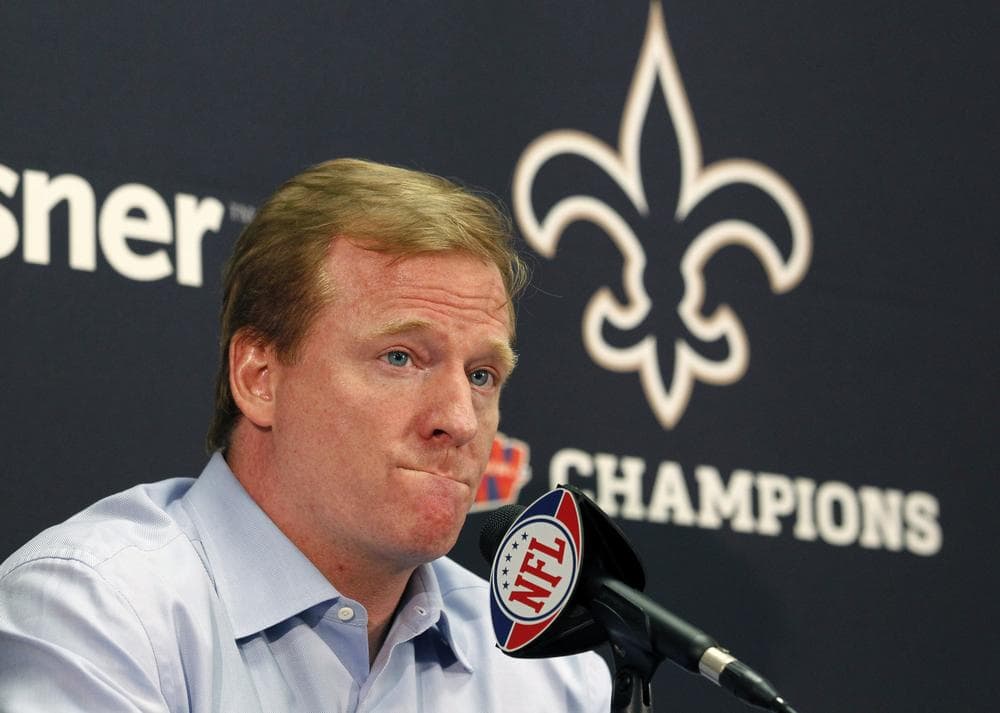Advertisement
NFL Bounties: Beyond The Playing Field
Resume
Paying bounties for hits that knock NFL players out of games raises issues that extend beyond the field of play. There are ethical concerns and even potential legal implications.
Former New Orleans defensive coordinator Gregg Williams is preparing to meet with NFL officials for a second time to discuss a bounty program he ran while working for the Saints and allegations that he organized similar systems with other teams.
To examine the issues surrounding bounty hunting programs, Bill Littlefield hosted a roundtable discussion with the director of the Sports Law Institute at Vermont Law School Michael McCann and ESPN's NFL Business Analyst Andrew Brandt, who served as vice president of the Green Bay Backers from 1999-2008 and also represented NFL players during his career as a sports agent.
Brandt told Only a Game he was never aware of any bounty programs aimed at injuring players, but he got a taste of how seriously the NFL took the issue after an incident in 2007 while he was with the Packers.
[sidebar title="Players And Coaches Weigh In" width="280" align="right"] Only A Game asked some of Gregg Williams' former players about bounty programs in the NFL and also got a historical perspective from three-time Pro-Bowl linebacker Steve Nelson.[/sidebar]"We were playing the Vikings and Adrian Peterson had just had this massive, 200-yard performance the week before. And I'm getting ready to go the game and I hear an ESPN report that the Packers' defensive backs are offering the defensive linemen DVDs from Best Buy if they hold Adrian Peterson under 100 yards," Brandt said. "I'm like, 'Hmm. That doesn't sound great.'"
Peterson suffered a leg injury during the game. According to Brandt, the play was clean, but the NFL called him the following morning.
"Then the word 'bounty' came up and I was like, 'Oh my God. Bounty? We're talking about DVDs from Best Buy," said Brandt, who also currently serves as the president of the National Football Post. "It was shown to me, at that point, how serious an issue it is and was and now this three years of overwhelming, mountain-of-evidence proof that they have [against Williams] will take this to another level."
It’s not exactly breaking news that NFL teams try to intimidate and hurt players with big hits, but Brandt says attaching money to those hits - even an amount that's small when compared to NFL salaries - changes things.
"That immediate gratification of getting that money will spur players to do something that potentially could injure, if that is the goal," Brandt said. "We all know you're supposed to hit as hard as you as can, but when that has an intent to injure ... that's the problem."
McCann, who also writes for Sports Illustrated, says that intent could raise multiple legal issues, including criminal charges such as battery.
"Obviously an NFL player gives permission, by playing in the game, [to be] tackled and he's going to get tackled hard by large guys, who are running really fast," McCann said. "He assumes that risk. He doesn't assume, though, that he's going to have somebody trying to take out his knees."
[sidebar title="Meanwhile In Indy..." width="330" align="right"] Bounties aren't the only big news story in the NFL. Bill Littlefield spoke to CBSSports.com's Gregg Doyel about the separate futures of Peyton Manning and the Indianapolis Colts.[/sidebar]According to McCann, because at least one coach and multiple players were involved, there could be an argument that there was battery as a result of a conspiracy. However, McCann says he's not expecting any legal action in the immediate future.
"Courts seldom get involved with sports disputes and that's particularly true in the United States," he added.
However, bounty programs could affect class action lawsuits brought by hundreds of former players who accuse the NFL of hiding information about the long-term effects of concussions and failing to properly protect players on the field.
"Lawyers in these lawsuits will use evidence of the bounty program to show that the league is not safe," McCann said. "The league could, of course, say [it's] really apples and oranges when you're looking at concussions versus the bounty programs."
NFL officials are scheduled to meet with Gregg Williams on Monday. Williams is currently employed by the St. Louis Rams. The league has not indicated when his punishment will be announced, but Brandt is anticipating a lengthy suspension.
"It's not out of the question that he has the year off," Brandt said. "He will be prohibited from coaching the Rams [for] at least, I think, half the season."
Brandt says it's likely that NFL will strip the Saints of at least one upcoming draft pick. He also believes that even if it turns out Sean Payton did not personally pay out any bounties, the coach will be punished along with other key figures in the Saints' organization.
"It was certainly an institutional problem and [Payton's] the head coach," Brandt said. "Beyond that ... general manager Mickey Loomis will feel the pain of this. He will have some sort of suspension."
Part of the NFL's popularity stems from its marketing of tough players delivering big hits, but McCann thinks the news of bounty programs damages the league's brand.
"Let's say there is an increase in fan interest among some fans because they think that bounties are going on, almost like a different sport," McCann said. "I don't think whatever value that [adds] to the NFL outweighs the loss of reputation that the league has when there are a lot of fans who are going to say, 'What am I watching? Am I watching competitive football or am I watching a hitman show?'"
This segment aired on March 10, 2012.